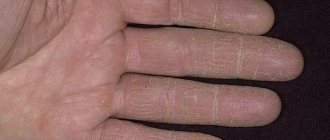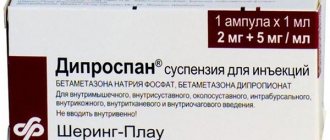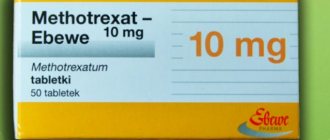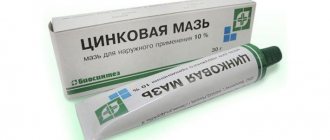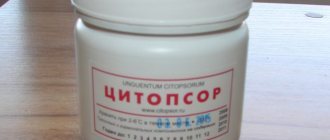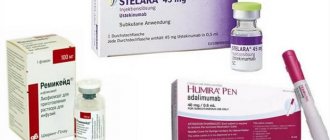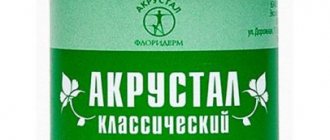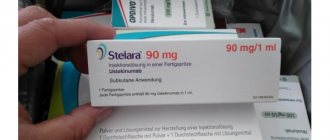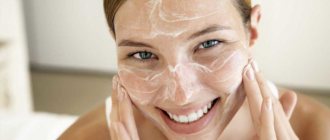Psoriasis, or scaly lichen, is a chronic dermatological disease manifested by redness, papules and plaques that form foci of inflammation. Most often it appears on dry and light skin. Along with various drugs Solariums have been successfully used for psoriasis.
One of the most effective methods is ultraviolet therapy. But the effect of solarium on plaques depends on the type of psoriasis ; in some of them, ultraviolet radiation will only worsen the condition.
Research shows that artificial sun has a positive effect on lichen planus . According to these data, in 90% of cases, patients note an improvement in their condition after visiting tanning studios.
Ultraviolet radiation prevents the spread of disease through the skin. Thanks to it, the production of vitamin D3 is enhanced. As a result, it is easier for a person to experience stressful conditions and neuroses. Therefore, the risk of strengthening and exacerbation of the disease is significantly reduced.
When visiting a solarium, it is important to learn about the spectral ratio of ultraviolet rays. It is known that waves of type A and B are always present. The most optimal and effective combination of UV-A rays with a length of 300-400 nm, and UV-B - 311 nm. Another important indicator is the presence of a reflector, that is, a reflective layer. It increases radiation efficiency by 10%. The reflector may already be in the lamp itself or on the lid of the solarium.
The benefit of a solarium for psoriasis lies in the multidirectional effects of UV radiation:
- UV A rays have a positive effect on people suffering from lichen planus, seborrhea, neurodermatitis and acne. They destroy a favorable environment for the proliferation of pathogenic bacteria on the surface of the skin.
- UVB rays promote active synthesis of vitamin D3. Thanks to it, the effect of stress on the body and the development of disease is reduced.
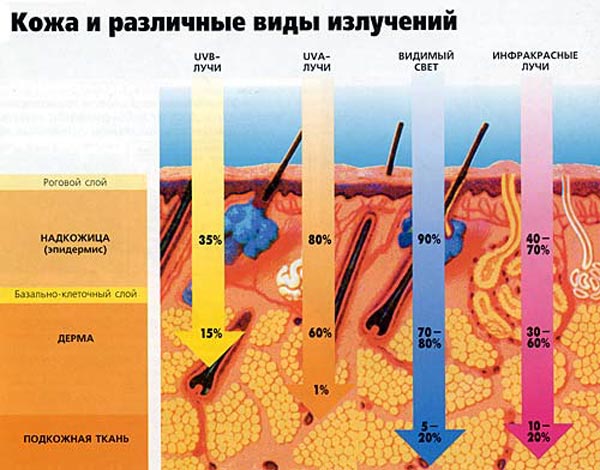
The positive effect of solarium as a treatment for a disease is as follows:
- Thanks to UV radiation, the development of plaque psoriasis is neutralized. The ulcers are dried out, healing occurs much faster.
- The resulting tan masks blemishes and differences in skin color, making rashes less noticeable.
Solarium for psoriasis is useful for men. Rashes on the penis cause great discomfort. Therefore, periodic sessions in a tanning studio will help cope with the problem.
A solarium cannot help in the following cases:
- With the pustular type, when the skin is covered with blisters, especially during exacerbation of the disease. Inflammation due to heating will only intensify, resulting in a chain reaction, and the number of elements on the skin will increase.
- For the summer type of psoriasis, that is, manifested under the influence of ultraviolet radiation.
- If scaly lichen is accompanied by erythroderma and photodermatosis.

Exposure to ultraviolet radiation will only worsen the condition, and the disease will begin to spread throughout the body.
Before going to a tanning studio, you should definitely consult your doctor. He will help you choose a schedule for visiting the solarium for psoriasis. You need to conduct an examination every week to adjust the course of therapy.
As a rule, the full course of treatment lasts 20-30 sessions. It is recommended to visit the solarium no more than once every 2 days.
Visiting rules:
- Give preference to vertical solariums, they allow you to warm up all parts of the body.
- Before visiting, you should ask your doctor and administrator about medications that are incompatible with ultraviolet radiation. They may lose their qualities. Some drugs increase photosensitivity, which leads to even greater pigmentation and worsening of the condition.
- It is usually possible to evaluate the effectiveness of solarium sessions after the first time. If no unpleasant sensations arise, then you can continue the procedure.
- The therapeutic effect cannot be enhanced by increasing the amount of session time. This can negatively affect the condition of the skin in general.
- You should choose only certified tanning studios. No need to chase low prices. In this case, the harm will be much greater.
- It is imperative to apply special products to areas affected by psoriasis and to healthy skin. They must be prescribed by a doctor.
- During treatment with a solarium, it is necessary to exclude all factors that provoke the disease. This includes alcoholic drinks, salty and spicy foods, stress.
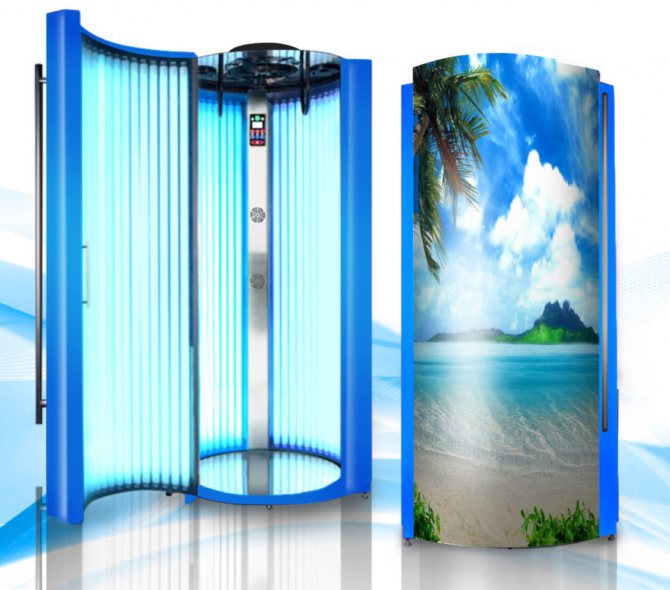
The effect of visiting a solarium lasts for two to three months . Then you need to repeat the course of procedures.
You need to start the course of treatment with a small amount of time, that is, it is preferable to spend no more than 2-3 minutes in the cabin . Then you can increase the duration of the session. However, doctors do not recommend staying under ultraviolet lamps for more than 5-6 minutes .
Read more in our article about solariums for psoriasis.
The benefits and harms of ultraviolet radiation
It is known that ultraviolet rays are a source of vitamin D, which allows the body to absorb calcium. But this type of radiation can sometimes harm a person.

Benefits of ultraviolet light:
- Stimulation of the production of antibodies that increase resistance to viruses and infections.
- General strengthening effect on the body.
- Relief of the inflammatory process.
- Prevention of prostate and rectal cancer.
- Protection from further aggressive sun exposure.
Ultraviolet rays can also be harmful. The danger is as follows:
- Getting burned. Frequent skin lesions provoke cancer.
- Eye diseases.
Lamps used in solariums eliminate the risk of burns if the session is carried out correctly. Such a device does not reproduce C-rays that are harmful to humans, which come from the sun.
For psoriasis, the benefits and harms of visiting a solarium should be assessed by a specialist. The doctor will advise which solarium and which ultraviolet lamps are useful.
Answer 4 questions and receive individual instructions for treating Psoriasis
You need to understand that solarium is not a method of treating psoriasis, but a cosmetic procedure.
Sunbathing in a solarium for psoriasis cannot be a therapeutic procedure. Because the lamps that are installed there are not intended for treatment. They have a different spectrum, wider than what is needed to reduce psoriatic rashes. And no doctor will prescribe procedures in a solarium, since in this case it is impossible to calculate the dose of ultraviolet radiation for treatment.
You can use a solarium only for tanning, to dry spots, but nothing more.
Get step-by-step instructions, diet and treatment plan!
Is it possible to go to a solarium if you have psoriasis?
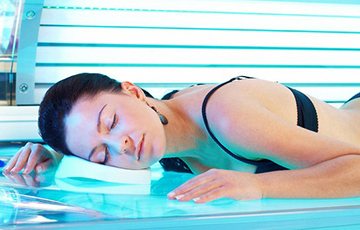
In some psoriasis patients, ultraviolet light improves the condition of the skin, in others it provokes an exacerbation. Much depends on the type and color of the epidermal integument, individual tolerance to rays, dose of exposure, form and severity of the pathology. For patients with an advanced stage of lichen planus, a solarium can cause harm: under the influence of ultraviolet radiation, the plaques will begin to crack, bleed and cause pain.
In most cases, a solarium is indicated for psoriasis of the scalp, palmoplantar, guttate and other types of the disease. Subject to the dosage and rules, ultraviolet radiation from lamps has only a positive effect on skin affected by lichen planus. According to reviews from doctors and patients, after solarium the condition of the dermis improves: inflammation goes away, psoriatic plaques become smaller, and the skin acquires a beautiful, even tone.
But experts warn that trips to the solarium should not be frequent. It is also important to observe the irradiation time and dosage. Otherwise, a person may get burned, which will cause a relapse of the disease.
Solarium is not a 100% cure for lichen planus. For some forms of pathology and characteristics of the dermis, ultraviolet irradiation is ineffective. You should not give up medications. A visit to the solarium is only an addition to the main treatment.
Statistics show:
- Artificial tanning alleviates the pathology in 50% of patients.
- For every 5 people, a solarium helps to significantly improve their skin condition.
- For every 10 patients, ultraviolet radiation worsens the course of the disease.
In order for a solarium to benefit a person with psoriasis, you need to choose a salon with certain characteristics of ultraviolet lamps. It is important that the device contains reflectors: a reflective device increases the effect of the treatment procedure by 10%.
Contraindications for visiting
When answering the question whether it is possible to use a solarium for psoriasis, it is worth emphasizing that such procedures are no more dangerous for patients than for healthy people. But there are still situations when visiting a solarium provokes negative manifestations and exacerbation of the disease. There is such a thing as “summer psoriasis,” which is characterized by exacerbations in the summer under the influence of sunlight. Solarium is categorically undesirable for such patients. Other contraindications to visiting a solarium for psoriasis are:
- photodermatosis;
- erythroderma;
- some previous cosmetic procedures;
- therapy with systemic drugs during exacerbation of the disease.
In other cases, if there are no objections from the attending physician, the sessions will only be beneficial and will help achieve a significant improvement in the condition and long-term remission.
How does a solarium help against psoriasis?
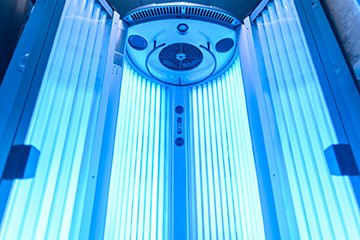
Solarium helps with psoriasis due to the beneficial effects of ultraviolet radiation on the dermis.
The rays stimulate the production of vitamin D, which helps relieve nervous tension, improves mood and increases resistance to stress.
It has been proven that anxiety and psycho-emotional stress are factors that provoke a relapse of lichen planus.
With tanned skin, the duration of remission increases. Ultraviolet light also strengthens the immune system and stimulates the body to fight disease.
In winter, many psoriasis sufferers experience exacerbations of skin pathology. This is due to a lack of vitamin D. Visiting a solarium during the cold season makes significant progress in the treatment of lichen planus.
Patient reviews
Feedback from numerous patients on this issue was divided. Some believe that this technique can lead to serious complications, while others remain of the opinion that a solarium is an excellent remedy for combating the symptoms of the disease. About 37% of respondents said they felt improvement and their psoriatic spots faded. The following reviews can be cited as an example:
Ilya, 32 years old, St. Petersburg. I have had the disease for more than three years. I tried many remedies, only the solarium helped. Attending the sessions helped reduce symptoms.
Marina, 22 years old, Ivanovo. The first time I used a solarium was to treat psoriasis. The plaques have almost completely disappeared and I feel normal again.
Negative reviews also occur. Some patients observed not a decrease, but an increase in the volume of the affected areas. The majority of respondents said that treating psoriasis with a solarium had no effect.
How to choose the right sunscreen
When visiting a solarium, it is important to use creams with UV protection. The compositions are applied to all exposed areas of the body, limbs and face. Psoriatic plaques should be handled especially carefully to avoid burns.
Creams not only protect the skin, but also provide a more even tan. They may contain the following substances:
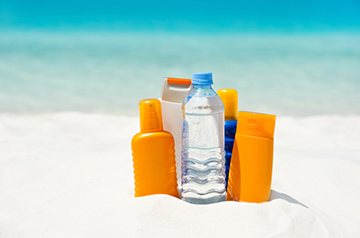
- Hemp oil. Increases the sensitivity of epidermal cells to ultraviolet radiation, improves the absorption of vitamins and other nutrients.
- Bronzers. These are natural tanning activators (henna, walnuts, carotene). Accelerate melanin production. The more bronzers, the darker the shade.
- Grape seed oil. Moisturizes the dermis.
- Methane acid. Expands capillaries, improves blood supply.
- Menthol, mint extract. Soothe the skin.
- Coenzyme Q10. Gives the epidermis firmness and elasticity. Has moisturizing and softening properties.
- Sandalwood, olive oils. Prevent redness and allergies. Suitable for sensitive skin.
Psoriasis sufferers are recommended to choose sunscreens that contain the components listed above. Before use, the product should be tested for tolerance. To do this, apply a small amount of cream to the bend of the elbow and evaluate the condition of the skin after 12-24 hours. If there are no rashes or redness, this means that the product can be used.
Types of phototherapy
In sanatoriums and specialized clinics you can undergo the following types of treatment:
- PUVA therapy;
- Spectral phototherapy;
- UVB therapy.
PUVA therapy is an innovative treatment method in which special chemical compounds are applied to the body, special medications are prescribed for oral administration, and then the patient is exposed to ultraviolet radiation in a powerful device. The method is highly effective, but has many contraindications and side effects.
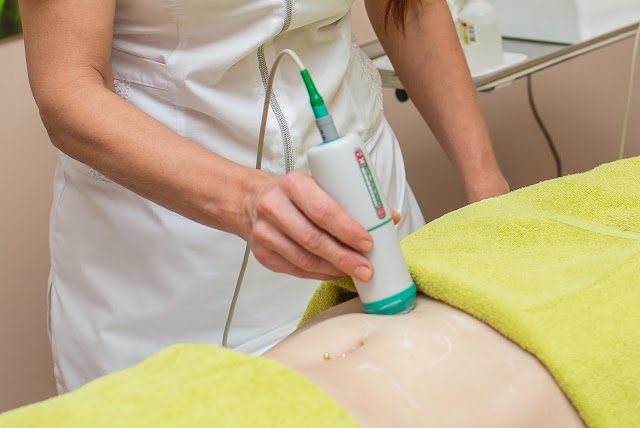
All these techniques can be used in combination or separately from each other. As a result, it is possible to achieve stable long-term remission. Treatment must be carried out in an outpatient setting under the constant supervision of specialists. In the therapy process, innovative equipment is used, its maintenance is expensive, so the cost of treatment is not affordable for everyone.
How many minutes is it good to sunbathe?
As a rule, the tanning procedure in a solarium does not exceed 5-10 minutes. In some situations, the duration may be increased or decreased.
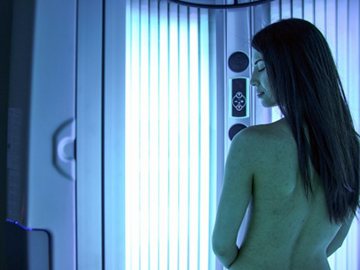
The duration of the session depends on a number of factors:
- UV lamp power;
- skin type;
- number of procedures completed;
- form of psoriasis.
To determine the optimal duration of the procedure, you need to consult a doctor.
You should not try to achieve faster and better results by increasing the time spent in the solarium. This may cause an exacerbation of the disease.
Experts recommend starting ultraviolet treatment from 3 minutes, gradually increasing the session duration to 10 minutes.
Therapy for psoriasis with sunlight
How do ultraviolet rays affect psoriasis patients? Their influence improves skin restoration, thanks to which plaques are eliminated faster and damage is healed. The sun in moderate amounts has a positive effect on the skin. In case of sunbathing for a long time, exacerbation of psoriasis caused by burns is possible. This disease is of an autoimmune nature, for this reason, patients have an increased likelihood of skin cancer, as well as early aging compared to people who do not suffer from psoriasis.

Are sunbathing and solariums acceptable for psoriasis? Yes, but only in moderate doses. Dermatologists advise sunbathing for only five to seven minutes daily during the first days. Over the following days, the time of this procedure can be slowly increased by another five to seven minutes, but the maximum total duration of exposure to sunlight should not exceed half an hour. Sunbathing is only permissible at the correct hours. The skin must be treated with protective agents, while areas affected by the disease should be avoided. In addition, mandatory treatment of plaques is required.
The disease causes an intense inflammatory process, which occurs in individual areas of the skin. With inflammation, the skin's sensitivity to sun exposure and other irritating factors increases. To avoid injury to the skin affected by the disease, a special product must be applied to it. Treatment of plaques is possible using an ointment based on activated zinc pyrithione. The “Skin-cap” spray is effective, penetrating deep into the skin, quickly relieving inflammation. It is also suitable for use after tanning has ended.
Recommended number of sessions
In each individual case, the number of sessions is determined individually. The standard scheme involves undergoing 20-30 procedures. People with sensitive skin types are recommended to undergo about 30 sessions with a reduced dose of ultraviolet exposure. For patients who tan quickly, 20 procedures will be enough.
To maximize the effect of therapy, you need to combine drug treatment with a visit to the solarium. The first session is a trial session. After it, the body’s reaction to ultraviolet radiation is studied for two days. If everything is normal, then the following procedures are prescribed.
How to allocate session time
In total, experts recommend a therapeutic duration of sessions from 20 to 30 days. In this case, special attention should be paid to the fact that the procedure is dosed. The very first session will be a trial session.
Next, the body should be monitored for a reaction for two days. If no negative aspects are identified, then ultraviolet irradiation sessions can be continued. But at the slightest suspicion of any deviation from the norm, it is immediately recommended to stop visiting the solarium, so as not to aggravate the painful condition.
It is prohibited to speed up the process of treatment sessions by adding time during one procedure or increasing the number of visits to the solarium. In such a negative way, you can reduce all previous efforts to zero or cause irreparable harm to the body. Treatment will go beyond effectiveness, and destructive phenomena will affect the skin and internal processes.
It is advisable to consult a cosmetologist in advance, who will recommend a cream for procedures in a solarium and a cream for use after the session. The effectiveness of artificial sunbathing will increase thanks to the use of such creams due to the fact that the creams will not allow the epidermis layer to crack or dry out.
Features of the effects of solarium radiation on the skin
There are two types of rays used in solariums:
- UV-A rays. This type of radiation helps to get rid of not only the manifestations of psoriasis, but also seborrhea, acne, and neurodermatitis.
- UV-B rays. Thanks to them, the production of vitamin D3 is enhanced, and this increases the body's resistance to stress and reduces the likelihood of psoriatic rashes.

Attention! If you have psoriasis, you need to carefully choose a salon, take an interest in the spectral composition of the lamps, and the presence of a reflector.
The mechanism of development of psoriasis
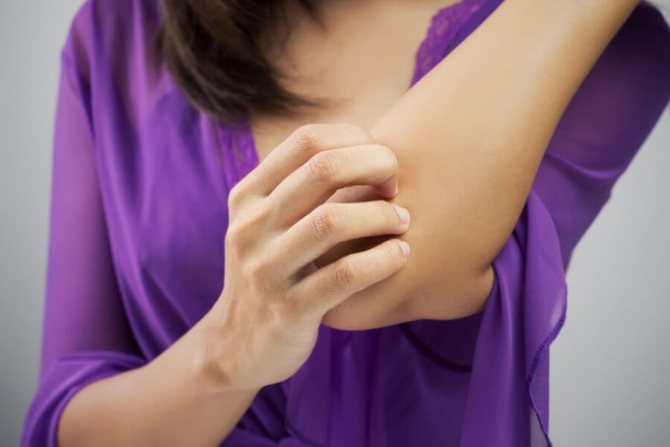
Psoriasis is a chronic autoimmune disease that cannot be cured forever. Modern medicine introduces innovative treatment methods, thanks to which the patient gets rid of annoying symptoms. In this way, stable long-term remission is achieved.
The essence of the disease is that the skin of patients renews itself too quickly. Old dried scales do not have time to fall off, but new layers of the epidermis are already growing. In this way, convex red plaques covered with a white coating are formed. Due to the slightest trauma to the skin, inflammatory processes develop in the affected areas and suppuration is possible.
At first, the rash is localized and has a clear shape. Over time, it grows significantly, covering almost the entire body. The most difficult thing to deal with is plaques under the hair. They cannot be treated with ointments and creams, and the slightest mechanical impact provokes bleeding.
The root cause of the disease has not yet been identified. Doctors cannot understand what provokes such changes in the body, why metabolic processes are disrupted. There are several known provoking factors:
- Nervous system disorders;
- Hereditary factors;
- Streptococcal infections;
- Allergic reactions.
It is impossible to say for sure when and how psoriasis will manifest itself; it is impossible to determine the susceptibility to this disease. If you have been diagnosed with this, you need to learn to live with it. It is impossible to completely get rid of the disease; periodically it will make itself felt. It is in your power and interests to ensure that relapses occur as rarely as possible. To do this, you need to find your doctor, whom you will completely trust, and follow all his recommendations.
Symptoms and signs of psoriasis
Psoriasis is a systemic disease, so the affected area is not only the skin, but also the spine, joints, immune and endocrine systems, and kidneys.
The disease begins even before the first external signs. The patient complains of a general deterioration in health, constant fatigue and fatigue, depression, and reluctance to lead an active lifestyle.
A characteristic sign of the disease is a rash in the form of papules. It is round in shape with clear edges, the color can be from bright pink to red with a scaly white coating.
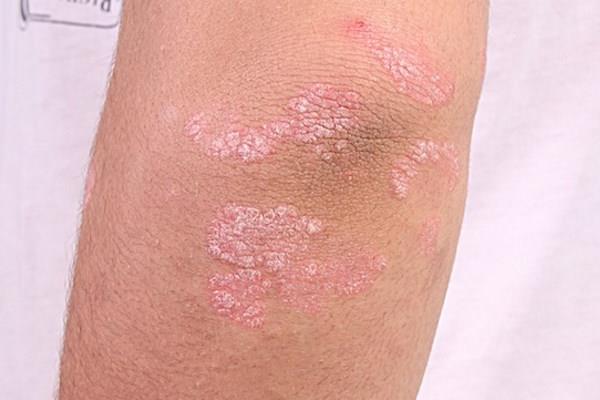
Psoriasis begins in places where the skin is injured, but there is also an atypical course of the disease, when the rash disperses chaotically throughout the body.
The disease can occur in people regardless of gender and age, as well as place of residence and climatic conditions. Papules grow every day and can reach a diameter of 80 mm. If left untreated, the size of the papules becomes larger and eventually they merge into large spots.
Psoriasis is characterized by the presence of symptoms:
- red rash that rises above the surface of the skin;
- the presence of peeling on grayish-white spots;
- itching at the site of skin damage;
- localization of spots - limbs, body, scalp, feet and palms.
The vast majority of patients note the seasonality of the disease, which is activated in the fall and spring. This feature of the course of the disease helped to suggest the positive effect of ultraviolet radiation on a weakened body.
Is it possible or not?
Is tanning beneficial?
Many patients are concerned about the question: are psoriasis and the sun compatible? Is it possible for those who suffer from this disease to sunbathe? No one will give you an exact answer, because sun rays affect different patients differently. Some people feel better, remissions from the disease last longer, and there are fewer exacerbations. Others experience worsening conditions. Scientists have even hypothesized that psoriasis appears due to a lack of ultraviolet rays (the cause of this disease has not yet been established). This hypothesis is confirmed by the fact that this disease is rare among residents of tropical countries. Patients who move from the middle zone to the south often recover without any treatment. But this is just a hypothesis; there is no scientific confirmation yet.
Doctors advise patients to go to the sea. Those who cannot yet afford such a vacation can sunbathe using a solarium. Are psoriasis and solarium compatible? Will the procedure harm your health?
Is a solarium beneficial?
A modern person, in order to get a beautiful tan, visits a solarium. There, the human body is exposed to ultraviolet rays, the same as from the sun, but without the harmful rays of UV-C. Does solarium help with psoriasis? Doctors never prescribe this procedure as a treatment, but they do not prohibit visiting it.
A survey was conducted on the topic “Psoriasis and solarium.” Patients with this condition were asked whether the procedure helped them. Of these, 21% answered that it helped, 36% noticed that there was a partial improvement, about the same, i.e. 37% said that it did not. And 5% of patients had an exacerbation.
Natural and artificial sunlight stimulates vitamin D production
Why is solarium effective for psoriasis? Doctors are confident that the improvement in well-being is due to vitamin D, which is used in the treatment of this disease. There are only 5 forms of this compound, some of them can be synthesized in the skin, while others become active under the influence of ultraviolet rays. Now scientists are paying special attention to the relationship between the development of psoriasis and the level of vitamin D in a person’s blood. The blood serum of sick people contains less of this vitamin than that of healthy people, and the blood is especially poor in it in winter. Under the influence of ultraviolet rays, its amount increases, so phototherapy, which is also prescribed for this disease, helps. The vitamin is produced if you go to a solarium for psoriasis. Another plus is the production of serotonin, the hormone of pleasure. It helps the body cope with stress, and stress is the main trigger of the disease. Stress hormones cause the amount of psoriatic inflammation to increase.
This is interesting: Methods of treating psoriasis in sanatoriums and clinics abroad
How dangerous is this procedure, can it cause harm? Dermatologists believe that patients suffering from the summer form of psoriasis should not undergo these procedures. In such patients, exacerbations of the disease occur in the summer, therefore, solarium is contraindicated for psoriasis. Those who have developed photodermatosis and erythroderma should not visit it. If you have an exacerbation of the disease, talk to your doctor before going to the solarium.
He prescribed you a number of medications, and you need to know whether artificial tanning is allowed for you and whether side effects will appear. Some medications cannot be combined with visiting a solarium.
Exacerbation of psoriasis is a contraindication to visiting a solarium
What can cause an exacerbation of the disease or provoke its relapse?
Despite the fact that the manifestations of psoriasis are unsystematic, there are factors that can trigger the appearance of rashes on various areas of the skin. Therefore, patients should be aware of this and, if possible, be warned against their influence. The following reasons aggravate the course of the disease:
- Overweight. It has been noticed that among those suffering from psoriasis, the majority are those who have varying degrees of obesity.
- Stress. Many patients notice that their psychological reaction to traumatic situations and circumstances aggravates the manifestations of the disease.
- Some medications taken by the patient for various reasons can trigger a relapse.
- Hypothermia.
- Damage and scratching of psoriatic plaques. It has been noticed that in the vast majority of cases, mechanical irritation of lichen planus causes its growth and the appearance of new rashes in nearby areas.
- Water procedures. Some people experience an exacerbation of the disease after taking a bath or swimming in a pond.
- Sun rays. Doctors consider moderate exposure to sunlight for psoriasis to be beneficial. But there are a certain number of patients who claim that such baths cause an exacerbation of their disease. Moreover, no matter how long they were under the sun. Therefore, the question of whether it is possible to sunbathe with psoriasis still does not have a clear answer. To decide for yourself how beneficial or harmful the sun's rays are in this case, you need to take into account several factors: individual sun tolerance, skin color and type, stage of the disease and its shape.
This is interesting: What is vaginosis: diagnosis and treatment of bacterial vaginosis in men and women
What is psoriasis
Squamous lichen or psoriasis mainly affects the area of the elbows and knees, and the head in the form of red rashes. The rashes develop into plaques that constantly flake and itch. The disease is predominantly inherited and difficult to treat. It is almost impossible to get rid of psoriasis, but you can reduce the main symptoms.
Patients with psoriasis are treated with light. If there are no contraindications, then you can use a solarium to reduce the symptoms of lichen planus.
Experts say that for psoriasis, sunlight of both natural and artificial origin in moderation is beneficial. Exposure to ultraviolet radiation significantly reduces the main symptoms of skin disease. However, it is not always possible to sunbathe on the beach. In this case, it is recommended to visit the solarium, strictly following the doctor’s recommendations.
We recommend reading: Guinea pig allergy: symptoms, first aid, prevention
